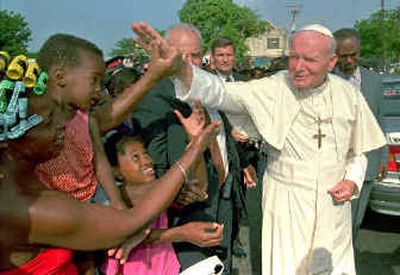Next pope may not come from Europe

MEXICO CITY – As cardinals rushed to the Vatican on Sunday to begin the process of selecting a new pope, many back home were asking a pointed question: If most of the world’s Roman Catholics live in the developing world, why has every pope been European?
The possibility that the next pope could come from Latin America, Africa or Asia is creating a buzz from Mexico City to Manila, from Tegucigalpa to Kinshasa. Many Latin American Catholics said the only way to improve on a papacy they overwhelmingly supported would be to select someone from their own ranks.
Their hopes were fueled by the last papal conclave, in which a Polish archbishop became the first non-Italian pope in 455 years, as well as by the global outreach John Paul II made the cornerstone of his papacy. They also have been boosted by sheer numbers: Half the world’s 1 billion Roman Catholics live in Latin America alone, and the church is seeing explosive growth in Africa and Asia.
Even outside Roman Catholicism, leaders from the developing world saw a chance for change.
“We hope that perhaps the cardinals when they meet will follow the first non-Italian pope by electing the first African pope,” Anglican Archbishop Desmond Tutu said Sunday from Cape Town, South Africa.
Many Catholics in poor countries said a pope from their own regions would better understand the challenges they face, and would make the church more relevant in the lives of its increasingly diverse followers.
“It will further help the church, whose membership is growing fastest in Asia, Africa and Latin America, if a new pope emerges from one of those areas,” said Isidore Chukwuemeka, a Catholic in Lagos, Nigeria. “That will help build loyalty in the universal church and reassure people that the rich countries are not calling the shots.”
While several names from developing countries have been mentioned as candidates, it is unclear what kind of chance Third World religious leaders stand. Only 21 of the cardinals eligible to vote on the new pontiff are from South America, and only 11 from Africa, compared with 58 from Europe alone.
The Dominican Republic’s Cardinal Nicolas de Jesus Lopez Rodriguez, who will participate in the conclave, said the next pope should be oriented toward Latin America, but he stopped short of saying the pontiff should be a native of the region.
“The majority of Catholics in the world are in Latin America, so whoever is elected should focus on this continent,” Lopez Rodriguez told reporters after celebrating a Mass at Santo Domingo Cathedral.
Hundreds of Dominicans cheered and wished the 68-year-old cardinal well after the Mass, with many chanting “we hope they pick you.”
Church leaders insist the cardinals’ decision will not be based on a geographical calculation. The candidates, they say, will be judged by their faith and their ability to lead.